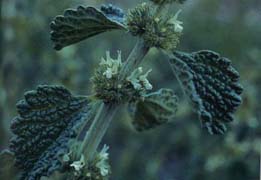User Login |
Sour DockSour Dock
Family Name: Buckwheat (3) Family Name: Polygonacea (3)
Latin Name: Rumex crispus (3)
Common Name: Sour Dock (3), Curled Dock (1:130), Yellow Dock (2:40)
Related Species: Genus Species
Body System Affiliations: Digestive System (3)
Botanical Description: Habit: Perennial (1:130) Size: 50-100 cm or more tall (1:130) Leaves: “oblong to lance-shaped, rounded at base, to 40 cm long by 5 cm wide, with crisp curly edges; basal leaves long-stalked; stem leaves short-stalked to stalkless, reduced in size upwards with sheathing stipules at the base” (1:130) Flowers: “greenish to dull rusty-brown, small, inconspicuous; numerous, whorled in dense, leafy-bracted clusters (to 40 cm in length) along upper part of stem and its branches” (1:130) Fruit: “Acheses, lustrous reddish-brown, 3-angled, enveloped in the inner 3 flower scales which are enlarged to 4-5 mm long when in fruit, net-veined, and usually each with a grain-like swelling centered towards the base; fruiting clusters dense, brownish; stalks with swollen joint below midlength” (1:130) Underground Parts: stout taproot is yellowish when cut (1:130)
Ecology: Habitat: “Waste places, roadsides, meadows, cultivated fields and pastures; also in undisturbed sites such as upper parts of tidal marshes and the driftwood zone of beaches;” (1:130) Range: “common to low elevations throughout southern part of our region (south of 54 degrees), scattered northwards” (1:130)
Western (European-American) Uses/Relationships: Medicine: Part Used: Root (2:40) Medicinal Actions: Alterative (2:40), purgative (2:40), cholagogue (2:40) Indications: Purgative action used to treat constipation (2:40); has been used extensively for treating chronic skin complaints (2:40) Body System Associations: Digestive System (3) Constituents: Anthraquinone glycosides (2:40), tannins (2:40) Applications: Decoction (2:40), Tincture (2:40) Preparation: Decoction: 1 to 2 tsp of root in cup of water, bring to boil, simmer gently 10 to 15 min. (2:40) Pharmacy: Tincture: take 1-4 ml 3 times a day (2:40)
References Cited:
1. Mackinnon, Andy, and Jim Pojar. Plants of the Pacific Northwest Coast. Vancouver, British Columbia: Ministry of Forests and Lone Pine Publishing, 1994.
2. Hoffman, David. The Herbal Handbook: A User’s Guide to Medical Herbalism. Rochester, VT: Healing Arts Press, 1998.
3. Eloheimo, Marja. sayuyay Botanical Project: Educational Garden Plant List. The Evergreen State College: Healing Gardens, 2006.
categories [ sayuyay Sister Garden ]
login or register to post comments
|
